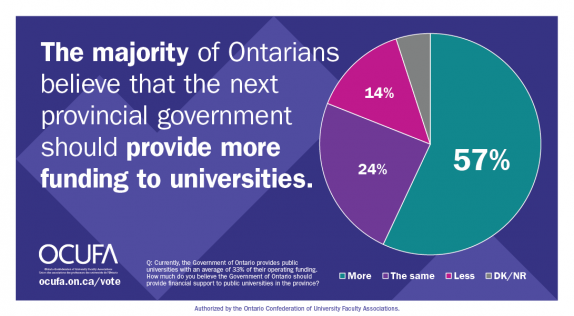On Saturday, February 26, OCUFA held its second Board of Directors meeting of the 2021-22 academic year. At the meeting, board members discussed the organization’s advocacy plans for the Ontario provincial election in June. OCUFA’s goal is to ensure the next provincial government is committed to supporting Ontario’s public universities. During the meeting, OCUFA member associations participated in small breakout groups to discuss priority ridings and develop regional action strategies.
2022 election priorities
Over the years, OCUFA has been a strong advocate for accessible, high-quality postsecondary education delivered through secure academic jobs, by publicly funded, autonomous universities that are governed collegially through shared governance. This vision has been formalized in several OCUFA policies over the years and informed the organization’s advocacy and political lobbying. OCUFA’s Board of Directors is focusing on three main areas in its advocacy platform for the 2022 Ontario election.
Government funding
Strong public funding for universities is necessary to support excellence in teaching and research and an accessible postsecondary education for Ontarians from diverse backgrounds. On a per-student basis, public funding for Ontario’s universities has been declining since 2008-09. As a result, Ontario university operating funding is now 40 per cent lower than the rest-of-Canada average on a per-student basis and provincially sponsored research funding is 55 per cent lower.
OCUFA has long advocated for enrolment-based public funding for universities and special grants for universities with specific missions or purposes. In recent years, OCUFA has also vocally opposed performance-based funding schemes and competitive models of university funding.
OCUFA is advocating for the next Ontario government to:
- Meaningfully increase university operating grants.
- Increase funding for research under the province’s research funding envelope.
- Boost funding for northern and bilingual institutions, as well as Indigenous programming, in recognition of their unique importance for Ontario’s postsecondary education system.
- Discontinue the performance-based funding model for Ontario’s universities.
Fairness for contract faculty
Full-time faculty hiring has stagnated at Ontario’s universities, while the reliance on contract faculty has increased at an alarming rate. It is widely acknowledged that contract faculty are paid less than their full-time colleagues for performing work of equal value. Research also suggests that the majority of contract faculty are women and racialized faculty are overrepresented in contract positions, making fairness for contract faculty an issue of equity.
OCUFA is advocating for the next Ontario government to:
- Remove the wage constraints legislated under Bill 124.
- Reform Employment Standards Act (ESA) language to include equal pay for work of equivalent value for contract workers, including contract faculty.
- Increase university funding to ensure faculty renewal so that retiring faculty are replaced.
Tuition fees
For years, Ontario has consistently had some of the highest student tuition fees in Canada, as universities seek ways to make up for low levels of public funding. Tuition fees now account for more than half of university operating revenues. OCUFA has been critical of the province’s high tuition fees and the barrier to access they present.
OCUFA is advocating for the next Ontario government to:
- Increase funding for the Ontario Student Assistance Plan (OSAP).
- Provide grants, not loans to OSAP recipients to reduce historically high levels of student debt.
Meeting highlights
Focus on equity
The OCUFA Board has made a strong commitment to equity, diversity, and inclusion, and this approach has been incorporated into all of OCUFA’s work, both internally and externally. At the meeting, board members were updated on OCUFA’s planned survey of member associations and committees to determine the equity resources and training that would be of greatest importance to them. The survey was released in early April and will inform OCUFA’s equity work moving forward. In addition, OCUFA has been compiling an analysis of collective agreement language that relates to equity, diversity, and inclusion. This analysis, when completed, will be provided as a resource for all member associations.
Presentation from Frank Graves, EKOS Research Associates Inc.
Frank Graves from EKOS Research Associates Inc. provided an overview of the results of the poll OCUFA commissioned in anticipation of the upcoming provincial election. The poll was designed to gauge the Ontario public’s perceptions of the importance of postsecondary education and support for OCUFA’s election advocacy priorities. The poll results show Ontarians believe the next provincial government should make postsecondary education a priority, introduce legislation to ensure contract faculty are treated fairly, provide more financial assistance to students, and increase funding for universities.
Presentations from Ontario political party representatives
The Board meeting featured presentations from representatives of Ontario’s New Democratic and Green parties. MPP Laura Mae Lindo, who is also the Official Opposition Critic for Colleges and Universities and Anti-Racism, provided an overview of the NDP’s positions on key postsecondary issues and noted the importance of having frank conversations about racism in Ontario’s education system.
MPP Mike Schreiner, Leader of the Green Party of Ontario, provided an overview of the Green Party’s plans for postsecondary education and the party’s positions on funding, contract faculty, and student aid.
Representatives of the Liberal Party of Ontario and the Progressive Conservative Party of Ontario were also invited to present at the meeting but declined.
Strategies for enhancing collegial governance
OCUFA’s University Governance Committee presented its latest resource, “Strategies for enhancing collegial governance and effectiveness in governance spaces,” which provides concrete and practical ideas for addressing some of the most common barriers to good collegial governance. It is designed to give member associations and individual faculty and academic librarian members sitting on governing bodies tools for improving governing practices at their institution and for being more effective in governance spaces.
New Contract Faculty Committee formed
For many years, OCUFA has had an ad-hoc Contract Faculty and Faculty Complement Committee dedicated to discussing the challenges resulting from the increased employment of faculty on short-term contracts and the impacts this trend has had on education, research, and governance at Ontario’s universities. In recognition of the fact that this will continue to be an important issue for years to come and the benefits of investing more resources in efforts to create more equitable and secure working conditions for contract faculty and academic librarians, the OCUFA board voted to create a new standing Contract Faculty Committee that will build upon the work of the formerly ad-hoc committee.
The next OCUFA Board of Directors meeting will be held on May 14 and 15, 2022.











